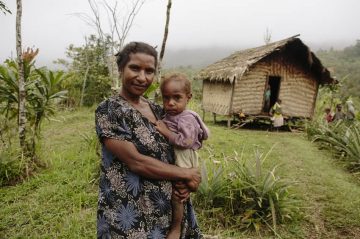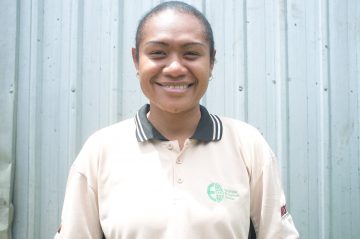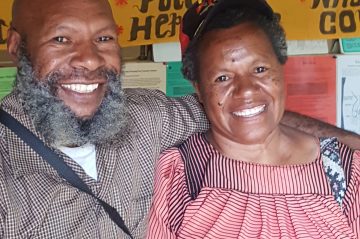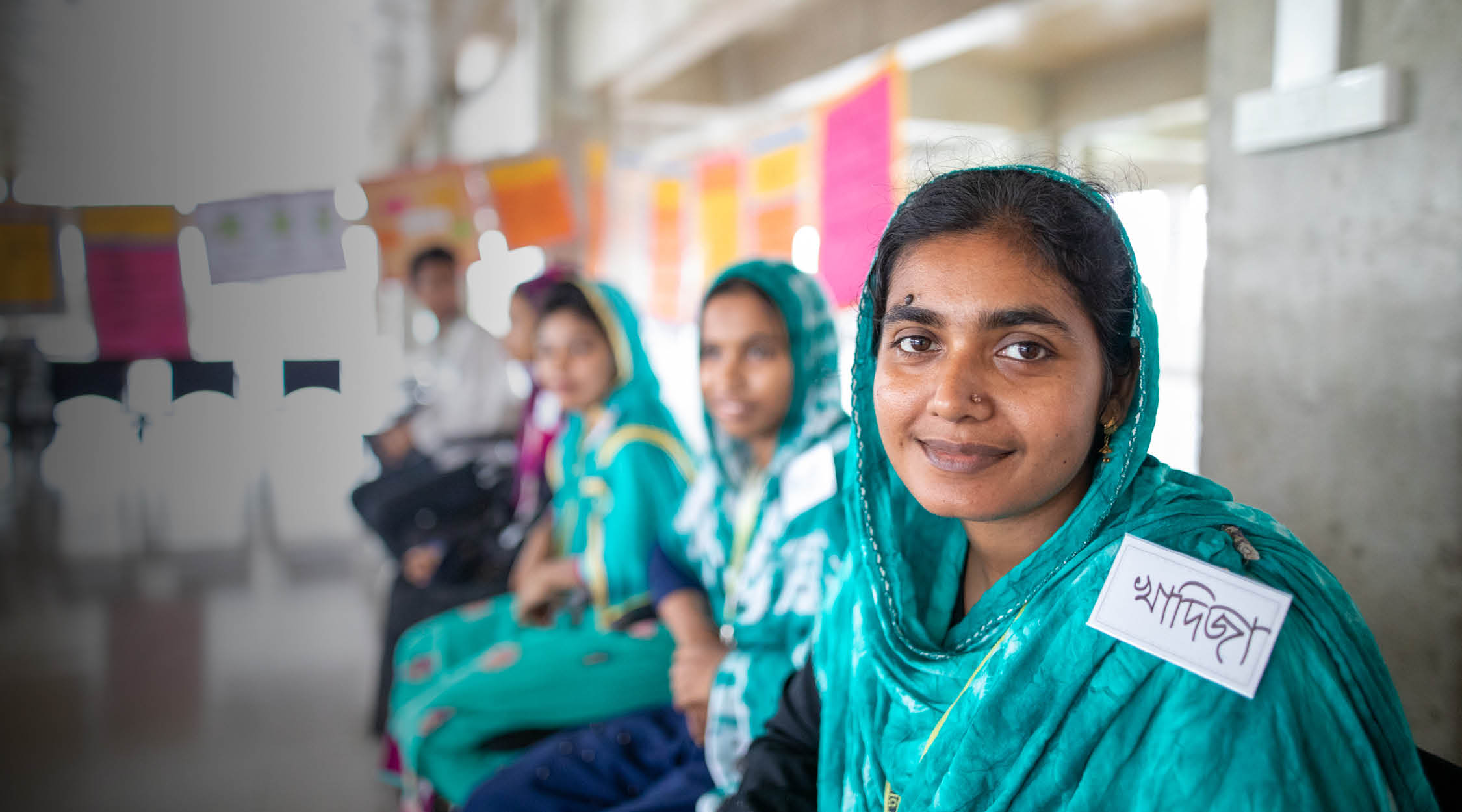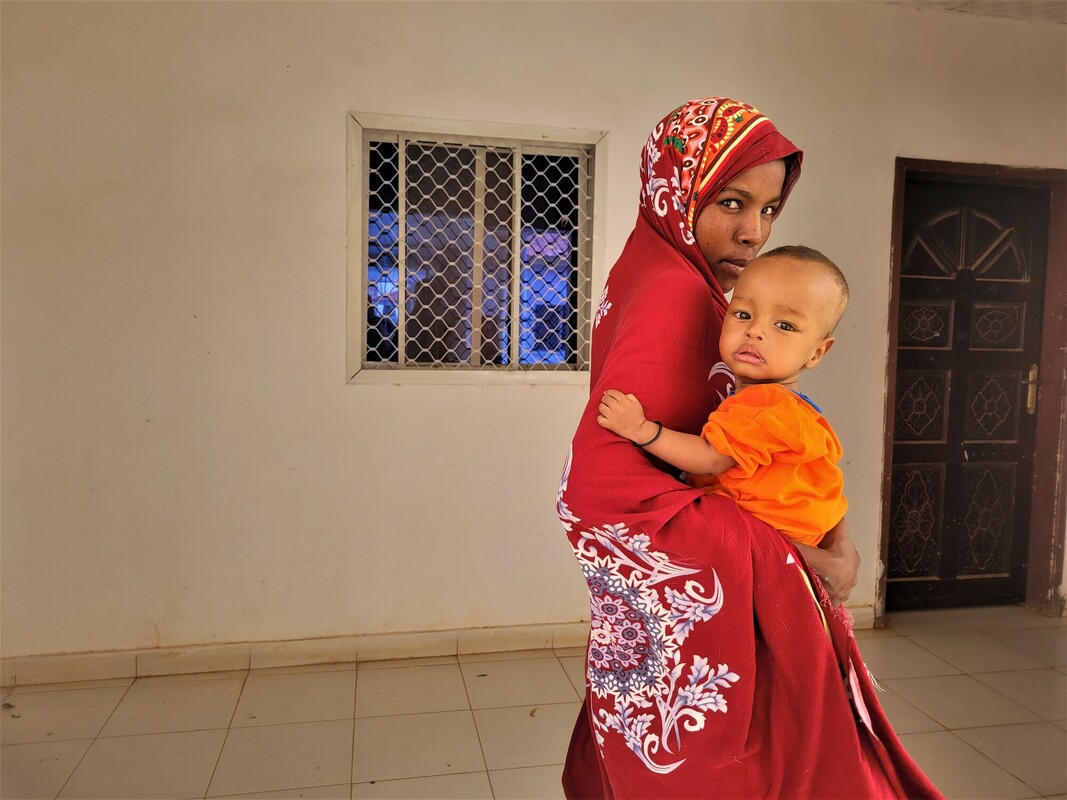Over 80% of PNG's population live in rural areas, with limited access to basic services and facilities. Donate Now.
Over 80% of PNG's population live in rural areas, with limited access to basic services and facilities. Donate Now.
Papua New Guinea, our nearest neighbour, faces many challenges in overcoming poverty.
More than 80% of the population live in rural areas, with limited access to health centres, education and agricultural services.
Women living in rural Papua New Guinea (PNG) suffer from poverty even more. They work long hours but are rarely involved in decision-making and have little control over the money they earn or the land they farm. Almost two-thirds of these women are also victims of violence.
CARE has been working in PNG since 1989. We focus on creating a more equal world for women and girls by improving access to health services, health information and education, and providing support to develop farming skills and take part in local decision- making. We also work with communities and families, encouraging positive attitudes and behaviours towards women.
Fast Facts
Population: 7.61 million
Life expectancy: 67.3 years (65.1 years male, 69.7 years female) (2017 est.)
Infant mortality: 48 deaths/1,000 live births (2018 est.)
Under-5 mortality*: 63 deaths/1,000 live births
Maternal mortality: 215 deaths/100,000 live births (2015 est.)
Adult literacy rate: 64.2% (65.6% male, 62.8% female) (2015 est.)
Access to improved drinking water: 40% (88% urban, 32.8% rural)
Access to improved sanitation: 18.9% (56.4% urban, 13.3% rural)
Labour force participation rate^: 74% male, 70.5% female (2018 est.)
Percentage of seats held by women in national parliament^: 0%
GDP per capita: $3,800 (2017 est.)
Latest estimates; Source: CIA World Factbook, *UNICEF, ^World Bank
Empowerment through education
While PNG has had many years of strong economic growth, rural and remote areas of PNG are far behind, especially in education and health services. Weak governance systems are at the heart of the problem where the use of government funding is often not transparent.
Children, especially girls from remote communities of PNG face challenges to gain a quality education. In the Eastern Highlands, CARE is helping communities demand improved education services from the government. We are bringing together government officials, school management and parents to communicate directly about the challenges their schools face and come up with joint solutions. This process keeps the decision-makers accountable and brings a better outcome for schools, teachers and children.
With the government of PNG, we are providing better teaching and learning materials to schools through the Pikinini Kisim Save (PKS) project. We are also providing scholarships to teachers so they can be better trained. Stronger supervision by the government and on-the-job training is also helping improve teaching.
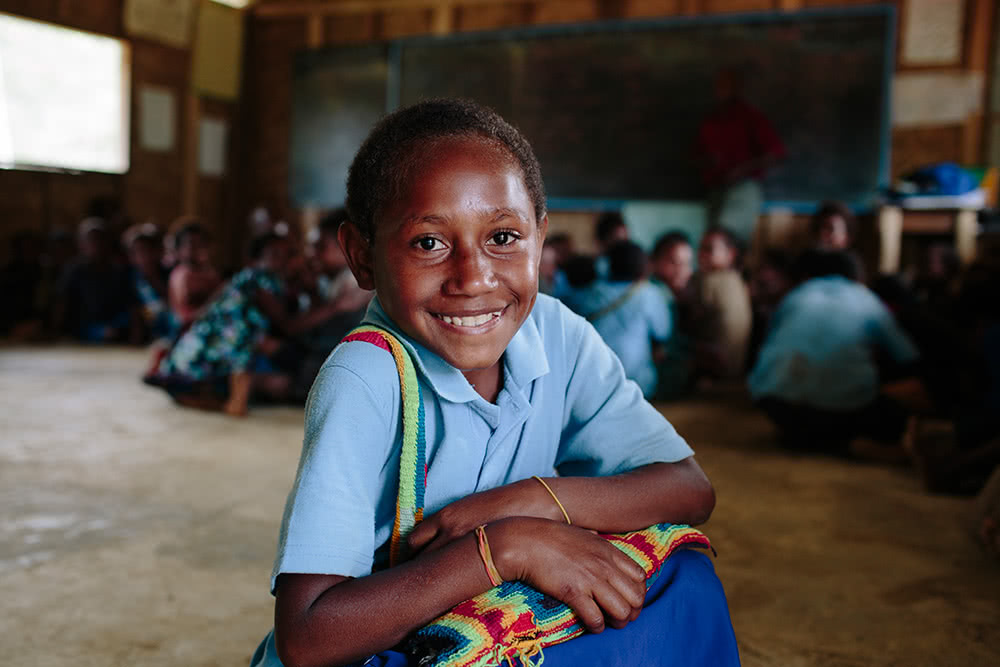
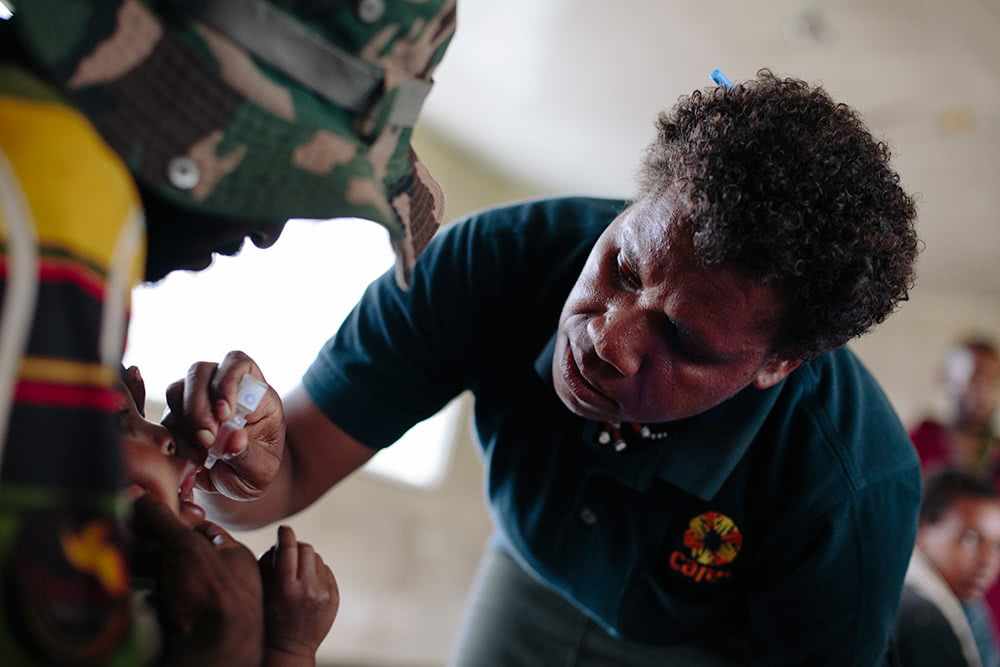
Improved health services
Many women in PNG die every year due to pregnancy or childbirth. An estimated 40% of women do not give birth in a health centre or hospital, putting them at greater risk of complications. Many of these women live in remote areas where a health centre could be many hours walk away. Thousands of newborns die every year, and thousands more that survive birth do not make it to their fifth birthday.
In these remote communities Village Health Volunteers bridge an essential healthcare gap. CARE has trained hundreds of local Village Health Volunteers selected by the community. These volunteers teach women and their families about women’s health, nutrition, and hygiene needs during pregnancy. They educate families about the danger signs to look out for during pregnancy and when and how to seek help. They also emphasise the importance of giving birth at a health clinic.
Empowering women and girls
Coffee and cocoa are major exports for PNG. Yet women who provide the majority of labour for small cocoa and coffee farms often miss out on the benefits of farming incomes. Women bear the double burden of household chores and farming work but have little control over the money they earn or the land they farm.
CARE’s coffee and cocoa programs aim to improve the situation for women farmers by working with coffee and cocoa exporters. We are building the agricultural skills of coffee and cocoa farming families, keeping the benefit of the women workers in mind. These families are then encouraged to share their new skills and knowledge with their neighbours and the broader community. CARE has trained thousands of coffee farmers on farm management and family business management. The training helps the farmers understand how important it is to give women an equal share in making decisions, household work and income. Men’s attitudes and behaviours towards women are already changing for the better, and farming practices are improving because of this training.
We are working with the cocoa and coffee industry to develop policies and processes that ensure greater equality for women. We have also set up a Coffee Industry Graduate Program to encourage more PNG women to become professionals that can help farmers with agricultural knowledge. Since the project started, the number of women participating in farming and business management training has also grown rapidly.
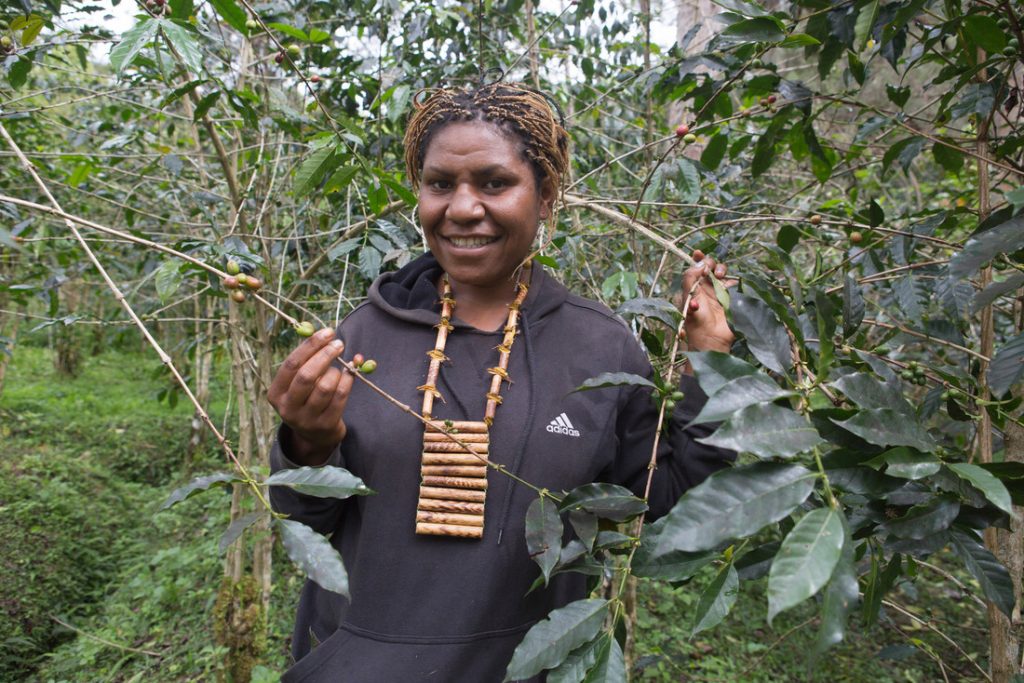
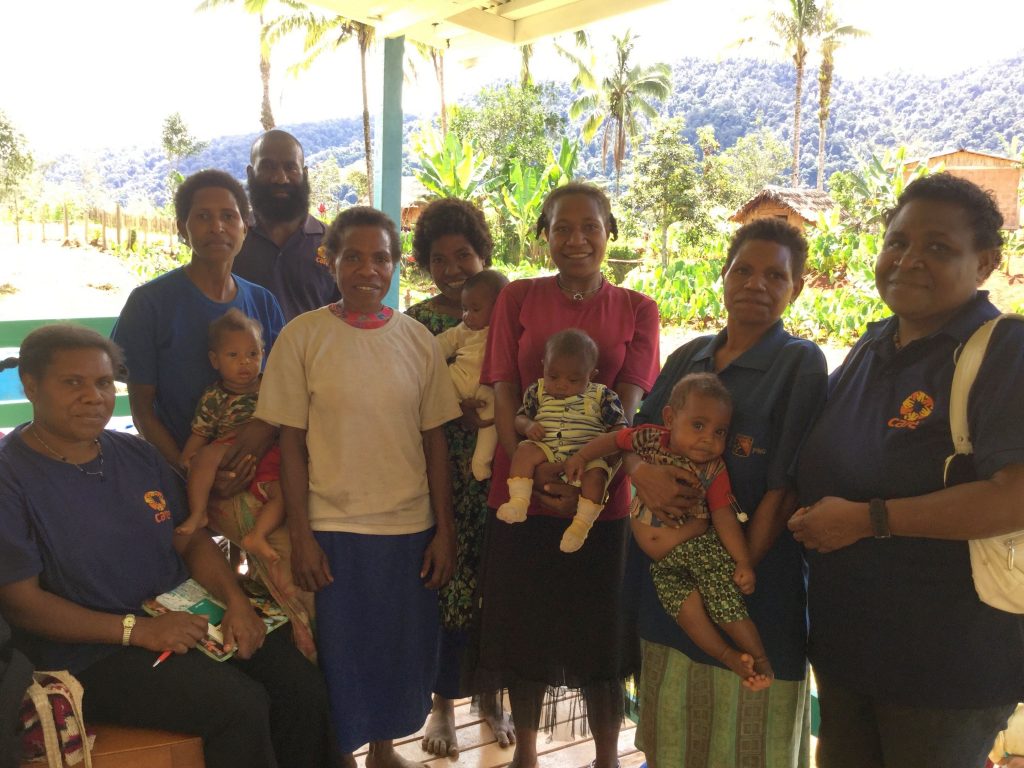
Health volunteers offer hope
Tabita Bafe lives in a remote village in Morobe Province which is cut off from public services like schools and hospitals by a major river. The village is only accessible by helicopter or several days’ walk through steep terrain.
In 2016, Tabita heard of CARE’s Maternal Health Volunteer training: “I was living in the village and I didn’t know how to help women. Many were struggling. There was no group for women to come together to talk about their health and keeping their babies strong. They did not understand how their children were getting sick and used to struggle a lot during deliveries. Most women did not come to the health centre because of cultural taboos.”
Tabita takes pride in the work she has done since the training she received from CARE. “I speak with all the women in the village and accompany them to the health centre when they need prenatal check-ups. I also speak with families about the importance of making sure pregnant women eat good food and get plenty of rest during pregnancy. In the case of birth complications, I help them with referrals to the regional hospital which is an 8-hour walk from the village.”
Donate now
Support our ongoing work to create a more equal world.
Your donation can help end extreme poverty and give people the means to build a better future for themselves in countries like Papua New Guinea.
For those living in extreme poverty, your support brings education and training, healthcare and clean water, nutritious food, and new ways to earn an income. And in times of crisis, you help us deliver emergency relief. Please donate today.
Read more about our ongoing impact in Papua New Guinea:
Project Evaluations
Improving Community Climate Resilience in Nissan Autonomous Region of Bougainville, Papua New Guinea
– More CARE evaluation reports from PNG and other countries are available at CARE’s Electronic Evaluation Library.
Other Resources and Highlights
-
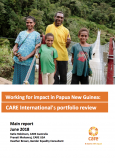 Download
DownloadWorking for impact in Papua New Guinea: CARE International’s portfolio review
This review focuses on CARE International’s program portfolio in Papua New Guinea.
-
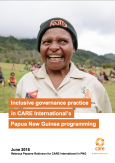 Download
DownloadCARE’s Governance Lessons Learned report
Most recent programming for improved governance in Papua New Guinea.
-
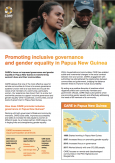 Download
DownloadWorking for Impact in Papua New Guinea
CARE’s focus on improved governance and gender equality in Papua New Guinea.
-
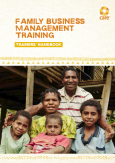 Download
DownloadFamily Business Management Training
Training farming families in the coffee and agricultural sectors.
The on-going work we do in Papua New Guinea is in partnership with these local organisations: AROB Provincial Health Office, Barola Haus Mama, Bougainville Healthy Communities, Catholic Health Services (Bougainville), Department of Provincial and Local Level Government Affairs, Eastern Highlands Provincial Division of Health, EBC Health Services, Leitana Nehan, LIFE Group, Lutheran Health Services, Marie Stopes – Lae, Markham District Health Services, Menyamya District Health Services, Morobe Provincial Division of Health, National Department of Education, National Department of Health, National Literacy Awareness Secretariat, Nissan District Village Assembly, Obura Wonenara District Administration, Office of the Governor – Eastern Highlands Province, Office of the Open Member – Obura Wonenara District, Osi Tanata, Provincial Division of Education – Eastern Highlands, Rurubu Health Centre (United Church), Taonita Teop & Taonita Tinputz Councils of Elders, Tinputz Cocoa Agriculture Community Services, and Tinputz District Administration.
Banner image ©Tom Greenwood/CARE
![RS47457_180719_PNG_BG4E_NAOMI_JH_467-scr Naomi has been a teacher in her hometown of Ukarumpa for almost 20 years. She has always been passionate about education, and for girls in particular. She recently received training through CAREs Better Governance for Education project to teach her the best way to tackle high illiteracy rates in rural areas. The subject she now teaches to Prep aged children, called Jolly Phonics, is enhancing the way young children learn to read and write. .
NAOMIs story in her own words
I am Naomi. I am 36 years old.
Im married, I have three children, Laverdy (f 12), Shelomith (f, 9) Jeremiah (m, 7). Laverdy wants to be a doctor. And she is well on the way to achieving it. She gets good grades. She is in secondary school.
My husband is from Bougainville. Hes a plumber. His name is Leslie. Hes 43.
Ive been a schoolteacher almost 20 years now. The job has changed very much over that time. I love my job. I see improvements in my teaching. And I enjoy seeing my former students graduate from higher institutions.
When I started I only had 19 students in my class, but in 2018 I have 36 students in my class. Thats a big change. Its still small compared to other schools though.
I decided to become a teacher when I was little; around six years old. I love it. I like talking to people and getting to know people. I had many teachers who inspired me, and Im sure they made me want to be a teacher. But also, I grew up here. I finished tenth grade in 1997, and I started a daycare centre here. And when elementary education was introduced, I took the six week training and then came back to teach those children. I was very excited by that opportunity.
I grew up here. This is my home, my community. I want to teach and support people in my community here.
When CARE came in, that was very special.
Sometimes the preps have to walk a long way. Sometimes they find it hard to come to school.
The government is wanting all the schools in the country to teach phonics, so learning Jolly Phonics was a new thing for me and CARE provided me with materials for the new curriculum to help me teach, and taught me new teaching skills. I learned how to teach Jolly Phonics to children. We also get refresher training as well. This is all new, and most of the teachers from the village dont have access to knowledge or resources like this.
After the training, my teaching style changed very much. I was able to take my resource books and adjust the lesson plans to suit the students in my community better.
The training I received from CARE was very, very good. I wish there were more trainers to help overcome the low literacy in the country, to help our students. There should be more Jolly Phonics teachers.
I grew up here. This is my district, I want good results. Thats why I am happy that CARE trained me, to improve those results. Now I am also a trainer. I will teach other teachers the best way to teach Jolly Phonics.
Children are more interested in the way the teachers are presenting lessons to them than in the content. So teachers must change the way we present lessons to the children to keep them interested.
The parents must help their children at home as well. Parents must spend time with their children to work on their homework as well. I see that as very important. Its more important than getting them to do the household chores or farming.
In our culture, boys are the head of everything. But girls are just as good as boys, and we do lots of work too. Its important to develop and change the way things have always been.
A well-educated woman will be more respected in the community. All women in the village should be respected but because of the culture, a woman who isnt educated wont feel respected. [Other people will] say bad words about her. Theyll make her feel bad. Like shes not doing what her parents ask her to do. They wont value her opinion on things.
The girls show more promise than the boys even at Prep. I encourage the girls. I tell them that they can be someone better than I am. If they dont have that kind of encouragement they might not come to school.
If they dont come to school, I call the parents and ask them why they are keeping their child at home. And I share their progress with the parents to keep them involved and to help them see how important it is that their child stays in school.
A lot of people in PNG are illiterate. Thats a big problem we see in school, especially in written exams at secondary school. And the fingers are being pointed at elementary school teachers like me. And I am very cross with this. So my desire is to have more training and grow further.
There needs to be more schools for the children who are left out. There needs to be more teachers trained and more funding given to schools. CARE has funded some remote schools, funded building their modern buildings, sponsored teachers.
Thank you so much for taking the initiative to come into our remote communities. Its the governments responsibility but you have done it. And I am looking forward to you sponsoring more teachers, and you will see success.
Interviewed by JOHN HEWAT in UKARUMPA on 18/07/2018.
Project information and scene setting information:
Children in PNG, especially girls from remote communities, experience profound challenges to getting a quality education. CARE links government and remote communities to develop joint action plans for schools that aim to meaningfully include women and girls. By strengthening community governance and sharing decision-making processes more equally, we see better education outcomes for all. CARE is also supporting Government Education Officers to train teachers and conduct supervisory visits, and is providing teaching aids and learning materials like books, stationery and phonics learning kits.](https://www.care.org.au/wp-content/uploads/2019/05/RS47457_180719_PNG_BG4E_NAOMI_JH_467-scr-1-360x239.jpg)
